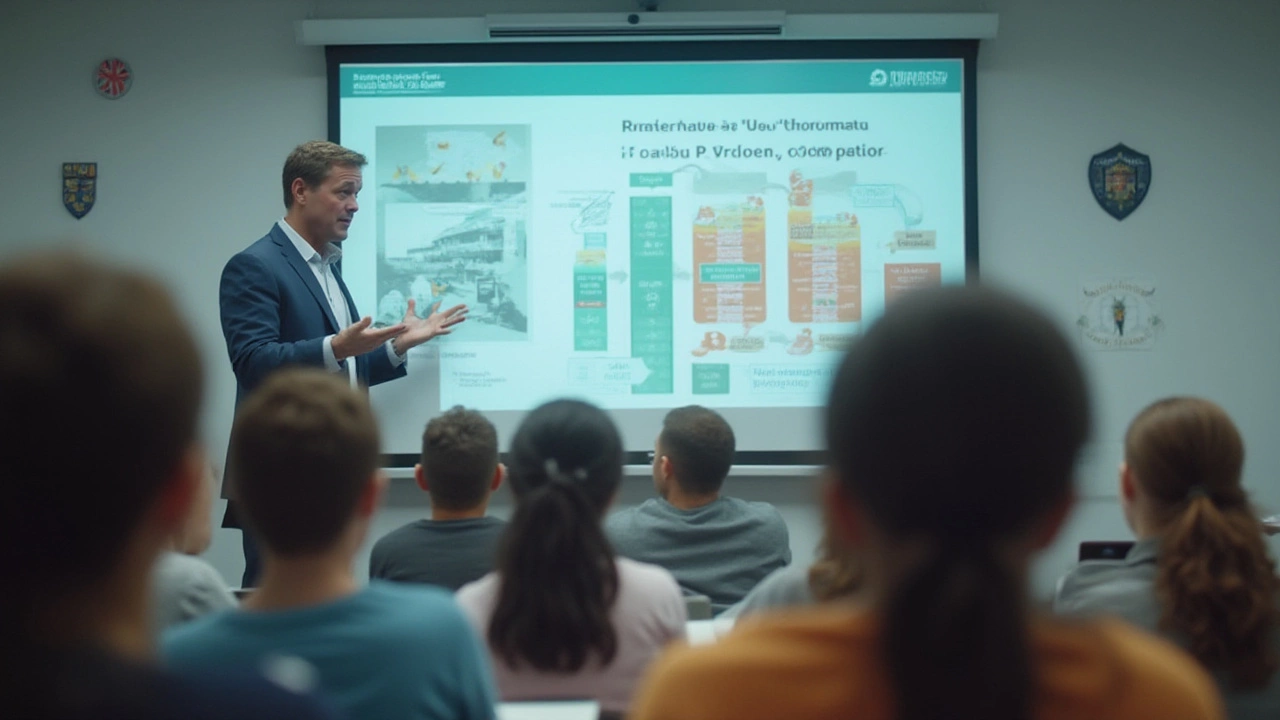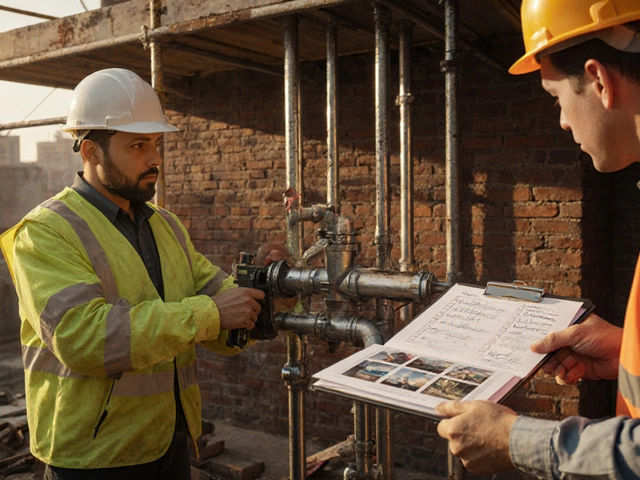Ever notice how the folks making sure your workplace isn’t a disaster zone have very different backgrounds? There’s a reason for that. The world of safety isn’t one-size-fits-all. Whether you’re thinking of a hard hat on a construction site or air quality testing in a lab, the path that gets you there looks a little different for everyone. The degree you pick can make or break your journey—and guess what? There’s not just one “best” option. There are several, depending on your target. So how do you figure out the best degree for a safety career that’ll open real doors?
Understanding the Safety Field: More Than Just Hard Hats
First things first—what are we even talking about when we say “a career in safety”? The safety world is bigger than people realize. Sure, there’s the classic health and safety officer, but there’s also environmental protection, industrial hygiene, risk management, emergency planning, ergonomics—the list could fill a page. The UK has over 30,000 registered occupational health and safety professionals, and a chunk of them didn’t originally plan to land in this field. Some come from chemistry, others from engineering, and quite a few even start out in education or the military. That’s because safety, as a career, draws on technical knowledge, communication skills, legal savvy, and a knack for problem-solving.
Unlike jobs that follow a straight path—like accounting or pharmacy—safety careers are a bit messier in the best way possible. Employers are looking for applicants who think on their feet, who get the technical details but also work well with everyone from the boardroom to the break room. That means when you’re picking a degree, you’re also signaling what kind of professional you want to be. Do you want to focus on keeping people safe in the workplace, or are you drawn to things like environmental compliance and sustainability? Are you a stickler for regulations, or are you fired up by public health campaigns? Figuring that out helps you cut through the noise when choosing your studies.
The Top Degrees for Safety Careers
Alright, let’s talk qualifications. The gold standard in safety, especially in places like the UK and US, is a degree that proves you know your stuff not just on paper, but in practice. You’ve probably seen job ads asking for a NEBOSH diploma, an NVQ in Occupational Health and Safety, or a Bachelor’s (BSc) in Safety Management, Environmental Health, or Occupational Hygiene. But people also get into the field with degrees in engineering, chemistry, environmental science, or even law—and then specialize later with additional certificates.
Here’s a closer look at what gets noticed:
- Bachelor’s in Occupational Health and Safety: This is sometimes called BSc Occupational Safety, and it covers laws, risk assessment, workplace hazards, emergency protocols, and behavioral safety. This is a direct pipeline to job titles like HSE (Health, Safety, and Environment) Officer or Manager.
- Bachelor’s in Environmental Health: If you’re into the intersection of human health, environmental hazards, pollution, and regulations, this one’s a powerhouse. Public sector jobs, local authorities, and even universities often look for this background.
- Bachelor’s in Safety Engineering or Industrial Engineering: These get you in the door if you’re eyeing manufacturing or heavy industry, and may lead to specialist roles in risk analysis or automation safety.
- Bachelor’s in Public Health: Yes, it sounds a bit broad, but if you think “big picture”—community wellness, population risk factors, pandemics—this background makes you stand out for jobs in emergency planning or health promotion.
- NVQ Level 5 Diploma in Occupational Health and Safety Practice: The NVQ route is hands-on and popular, especially in the UK, for those already working. It’s assessed on real-world performance and fits if you prefer learning while working rather than lectures and exams.
Degrees in biology, chemistry, environmental science, or law aren’t wrong turns either. Many safety experts, especially those who aim for management or consulting, collect early science or legal backgrounds and then pick up specialist certifications like NEBOSH, IOSH Chartered Membership, or university-level postgrads later on. It’s the perfect field for career switchers.
If you’re more curious about how the food gets made—literally—then food safety and microbiology degrees can take you into quality assurance roles, a growing niche as regulations tighten up post-Brexit. And for those already on the job, short courses (like the NEBOSH General Certificate) can add serious firepower to a CV in less than half a year of study.

Comparing University Degrees: What Courses Actually Cover
Let’s say you’re eyeing a university degree. What separates these different safety-related courses? BSc degrees in Health and Safety usually drill deep into risk assessment, fire safety, environmental management, accident investigation, and the legal framework around health and safety in the workplace. Expect coursework on standards like ISO 45001 or exposure to EU/UK regulations. Labs and case studies bring the theory to life, like using real workplace accident reports to develop practical safety improvements.
Environmental Health degrees throw public health, food safety, housing standards, noise pollution, air and water quality into the mix. You might find yourself out in the field, surveying local properties or tracing food contamination outbreaks with local authorities. Industrial or Safety Engineering degrees mash up systems analysis, design safety, ergonomics, and machinery risk assessment. These are less about office-bound report writing and more about making sure pipes don’t blow up or robots don’t flatten people—real, hands-on stuff.
Whatever path, placement years or internships supercharge your credibility. Employers always talk about wanting “real-world experience.” If your course offers a year in industry or hands-on projects, you’ll walk out lightyears ahead of people without that experience. According to the UK Office for National Statistics, safety grads with industrial placements see almost 20% higher starting salaries—and way less time hunting for a first job.
The toughest part for students is the legal side. Every country has its own playbook for workplace compliance, from COSHH (Control of Substances Hazardous to Health) to REACH (Registration, Evaluation, Authorisation and Restriction of Chemicals) if you’re jumping into chem-heavy jobs. If the legal bits bug you, stick with practical programs that weave in regular case studies and mock site visits rather than endless lectures on statutes.
Beyond the Degree: Professional Certifications and Skills That Matter
Here’s the curveball—your degree is crucial, but in safety, formal certifications and practical skills often matter just as much. Employers drool over NEBOSH certificates, IOSH (Institution of Occupational Safety and Health) status, or Chartered Safety Practitioner credentials. In fact, even with the fanciest degree, you’ll probably need to pick up some of these after you graduate if you want to climb the ladder fast.
- NEBOSH National Diploma: Deep-dive, internationally respected, loved by large employers.
- IOSH Chartered Membership (CMIOSH): Gets you into the ‘pro’ club—excellent for networking and job security.
- NVQ Level 6 Diploma: Hands-on, workplace-based (think: “prove you can do it, not just talk it”).
- Specialist certificates in construction, fire risk, or environmental management if you’re zoning in on a niche.
Don’t overlook skills that you won’t find on a syllabus. Communication is king. You need to explain hard rules in a way that makes sense to everyone, from trainees to executives. Tech skills matter, too, especially with the rise of digital risk assessments, e-learning, and safety compliance apps. By 2023, LinkedIn data showed that health and safety roles listing digital literacy as a must-have were filled 40% faster than those that didn’t. Basic data analysis skills, being able to work with spreadsheets and incident reports, or understanding how to build a digital dashboard for tracking accidents—this is what makes you future-proof.
Something nobody tells you: soft skills can be a deal-breaker. You’ll mediate arguments, train nervous staff, or even manage crises. Being certified in first-aid or crisis response doesn’t just look good, it shows you don’t crumble in chaos. Safety meetings can be tense, especially if people are set in their ways, so people who bring confidence and calm always rise quicker.

Making Your Choice: Tips for Picking the Right Safety Degree
This might sound overwhelming, but it actually gives you a bit of breathing room to pick something that fits. Here’s what to ask yourself:
- What kind of environment excites you—healthcare, construction, oil rigs, offices, government?
- Do you want to be in the field, or are you more of a policy, process, and paperwork person?
- Is your aim local work, or do you want a shot at international jobs? (Some degrees, like safety engineering and NEBOSH, open doors globally.)
- How quickly do you want to start working? If “ASAP” is your answer, dipping into NVQ or certificate programs while working could be perfect.
Check out job boards and see what employers are actually asking for in your dream jobs. Look up LinkedIn profiles of people in senior roles you admire—trace their paths. Most will show a blend: an undergrad or hands-on diploma, a specialist cert or two, and then steady progress through bigger, riskier, and more varied jobs over time.
By the way, don’t buy into the myth that if you didn’t major in safety, it’s too late. Loads of folks come into safety after time in the military, emergency services, science labs, and even law. If you’ve been working in a related area, hands-on experience plus a focused cert can launch you farther than a fresh grad with zero life experience.
At the end of the day, the safety degree and certification path you pick is the biggest draw for recruiters and employers, but showing you can pair that with practical know-how, resilience, and good people skills will put you at the front of the line. The world is only getting more focused on well-being, risk control, and environmental standards—there’s never been a better time to launch a career in safety, whichever degree you choose.





Write a comment